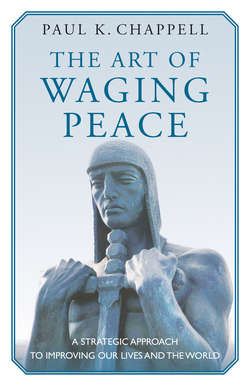Читать книгу The Art of Waging Peace - Paul K. Chappell - Страница 13
На сайте Литреса книга снята с продажи.
CHAPTER 1 The Labyrinth of Trauma The Wars That Followed My Father Home
ОглавлениеThe unconscious mind has no past. Like a bizarre alternate universe where time does not exist, the unconscious mind relives traumatic experiences from long ago as if they were happening in the present. This explains why so many soldiers return from war, but their minds never truly come home. I began to realize this as a child, because my father fought in the Korean and Vietnam Wars. Like many soldiers, his body came home alive, but his mind never fully returned from the battle overseas.
In his book Achilles in Vietnam, psychiatrist Jonathan Shay shares the story of a Vietnam veteran whose unconscious mind relives traumatic events from the war, such as the fear of a night ambush. When a person’s mind is stuck in the alternate universe of trauma, the line between past and present ceases to exist.
I haven’t really slept for twenty years. I lie down, but I don’t sleep. I’m always watching the door, the window, then back to the door. I get up at least five times to walk my perimeter, sometimes it’s ten or fifteen times. There’s always something within reach, maybe a baseball bat or a knife, at every door. I used to sleep with a gun under my pillow, another under my mattress, and another in the drawer next to the bed . . . So it’s like that until the sun begins to come up, then I can sleep for an hour or two . . .
I was real lucky [my employers] kept me so long. They understood that sometimes I just had to leave work. And they never laughed at me when I hit the floor if there was a loud bang or something. I know guys here [in the treatment program] who work other places who had firecrackers lit off just to see them dive over a conveyer belt or something like that. Or their supervisors pushing them, mind-fucking them, pushing them till they lost it, so they could get rid of them. That never happened to me. Once a lamp in the ceiling exploded with a loud bang, and I dove into a tank of lubricant for the cutting machines. Oof! It was awful. But nobody laughed at me . . .
I don’t deserve my wife. What kind of life is it for her married to me? She says, “Let’s take the kids out for dinner.” And I say, “Sure, let’s go.” So we get to the restaurant and we walk in the door and I say, “Whoa!” when I look around and see all those people. So the hostess shows us to a table right in the middle, and I say, “How about there in the corner?” and she says, “There’s people there,” and I say, “We’ll wait.” Meantime my wife is looking at me and there’s sweat running down my face. I can’t sit with my back uncovered . . . So after we wait thirty minutes for the table in the corner we start walking through the restaurant to it and my heart’s pounding, pounding and the sweat’s rolling off me and I say, “I gotta go.” So they sit down and eat and I stand up in the parking garage, the second floor overlooking the entrance to the restaurant where I have a real good line on everything going on.1
Like mud that sticks to the soles of our shoes, war has a way of sticking to the human mind and following people home. As a child my life was turned upside down when the wars from my father’s past reemerged in the present, away from the battlefield and behind closed doors. I have fond memories of being three years old and watching my father tend to his garden, feed the birds in our backyard, and chase away a spider that almost frightened me to death. But when I was four years old, everything changed.
I was sleeping peacefully late one night when I felt someone grab my leg and drag me from my bed onto the floor. My leg was pulled so hard I heard my pajama pants rip down the middle. Looking up and seeing my father, I began to panic as he pulled my hair and told me he was going to kill me. His cursing and my screaming woke my mother, who ran into the room and bear-hugged him until he finally calmed down.
When I was four something else occurred that I could not understand at the time, but that I later attributed to my father’s war experiences. One evening I heard him screaming at my mother and threatening to shoot himself with his pistol. This was the first time I heard him threaten to commit suicide, but it would not be the last. Throughout my childhood, I watched my father lose his grip on reality, and this frightening behavior caused me to struggle with my own sanity. As I grew older, the trauma I inherited from my father caused me to embark on a relentless search for understanding, peace, and trust.
